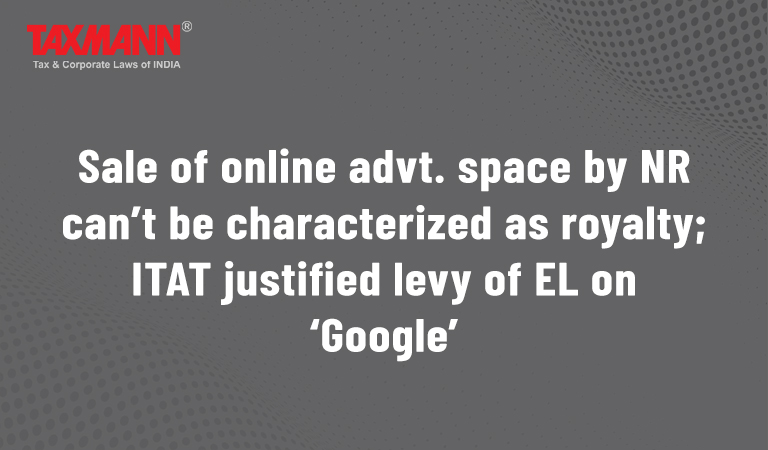Sale of online advt. space by NR can’t be characterized as royalty; ITAT justified levy of EL on ‘Google’
- Blog|News|International Tax|
- 2 Min Read
- By Taxmann
- |
- Last Updated on 22 October, 2022

Case Details: Google India Private Limited v. DCIT - [2022] 143 taxmann.com 302 (Bengaluru-Trib)
Judiciary and Counsel Details
-
- George George K, Judicial Member & Ms Padmavathy S., Accountant Member
- Percy Pardiwala, Sr. Adv. Anmol Anand, Ms Priya Tandon, Advs. & Vinay Mangla, CA for the Appellant.
- K.V. Aravind for the Respondent.
Facts of the Case
The issues involved in appeal revolve around the taxability of payments received by Google Ireland Limited (GIL) from the assessee, who was engaged in the business of online advertisement space to advertisers in India.
The Assessing Officer (AO) sought to characterize these payments be royalties as defined in section 9(1)(vi). The lower authorities held that the assessee had been granted the use of or right to use trademarks, other brand features, and the process owned by Google Ireland for the purpose of distribution of the Adwords program. Thus, the sums payable to Google Ireland were royalty.
ITAT Held
On appeal, the Tribunal held that it is true that the Google Adword program was commercially and profitably exploited in a commercial sense and profitable manner in India to generate revenues from Indian customers or advertisers. This is the business or commercial aspect of the transaction.
However, the stand of the lower authorities that these payments are in the nature of Royalty cannot be upheld merely because the marketing, distribution, and ITES activities are carried out in India and revenues are generated from India or Indian Advertisers.
In the context of online advertisements, including advertisements where the payment is based on the number of clicks (i.e., CPC basis), the Technical Advisory Group (TAG) of OECD, recommended the taxability of such payments under Article 7 of the relevant DTAA. The said Article 7 deals with “business profits” and not royalty.
Unless the non-resident, who is engaged in the sale of online advertisement space, has a PE in India, no portion of business receipts earned by it from the sale of online advertisement space in India can be brought to tax in India under the Act read with the relevant DTAA.
The above view is supported by the insertion of provisions related to the Equalisation Levy (EL) by the Finance Act, 2016. If the online advertisement was already covered under the definition of royalty, then bringing it as part of the EL scheme would not arise.
Disclaimer: The content/information published on the website is only for general information of the user and shall not be construed as legal advice. While the Taxmann has exercised reasonable efforts to ensure the veracity of information/content published, Taxmann shall be under no liability in any manner whatsoever for incorrect information, if any.

Taxmann Publications has a dedicated in-house Research & Editorial Team. This team consists of a team of Chartered Accountants, Company Secretaries, and Lawyers. This team works under the guidance and supervision of editor-in-chief Mr Rakesh Bhargava.
The Research and Editorial Team is responsible for developing reliable and accurate content for the readers. The team follows the six-sigma approach to achieve the benchmark of zero error in its publications and research platforms. The team ensures that the following publication guidelines are thoroughly followed while developing the content:
- The statutory material is obtained only from the authorized and reliable sources
- All the latest developments in the judicial and legislative fields are covered
- Prepare the analytical write-ups on current, controversial, and important issues to help the readers to understand the concept and its implications
- Every content published by Taxmann is complete, accurate and lucid
- All evidence-based statements are supported with proper reference to Section, Circular No., Notification No. or citations
- The golden rules of grammar, style and consistency are thoroughly followed
- Font and size that’s easy to read and remain consistent across all imprint and digital publications are applied



 CA | CS | CMA
CA | CS | CMA
